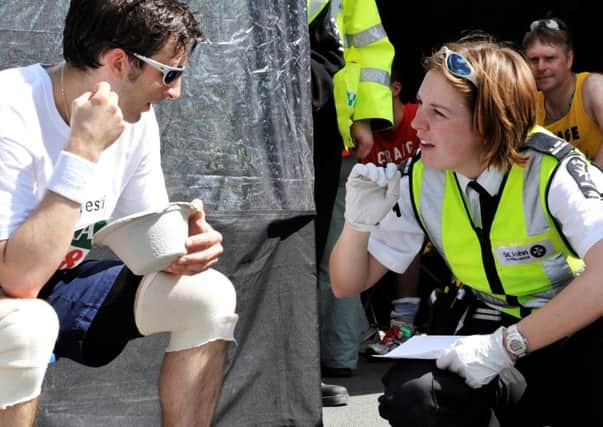ST JOHN AMBULANCE: How to recognise and deal with dehydration


Dehydration occurs when the amount of fluids lost from the body is not adequately replaced.
Dehydration can begin to develop when a person loses as little as one per cent of his body weight through fluid loss.
Advertisement
Hide AdAdvertisement
Hide AdA two to six per cent loss can occur during a typical period of exercise on a warm day; the average daily intake of fluids is 2.5 litres (4 pints).
This fluid loss needs to be replaced.
In addition to fluids, the body loses essential body salts through sweating.
Severe dehydration can cause muscle cramps through the loss of body salts.
If untreated, dehydration can lead to heat exhaustion.
The aim of first aid is to replace the lost water and salts through rehydration.
Advertisement
Hide AdAdvertisement
Hide AdWater is usually sufficient but oral rehydration solutions can help replace lost salt.
Recognising the symptoms:
• Dry mouth and dry eyes.
• Dry and/or cracked lips.
• Headaches and light headedness.
• Dizziness and confusion.
• Dark urine.
• Cramp with a feeling of tightness in the most used muscles, such as the calves.
• In babies and young children, pale skin with sunken eyes. In young babies the soft spot on the head (the fontanelle) may be sunken.
Follows these simple steps to help:
• Reassure the casualty and help them to sit down. Give them plenty of fluids to drink.
Advertisement
Hide AdAdvertisement
Hide Ad• If the casualty is suffering from cramp, stretch and massage the affected muscles. Advise the casualty to rest.
• Monitor and record the casualty’s condition. If they continue to be unwell, seek medical advice straightaway.
• For those looking for quick, easily accessible first aid information, the St John Ambulance app is available free on smartphones and the website (www.sja.org.uk) offers demo videos, an interactive game, and lots of free advice. For more information about first aid courses please call 0303 003 0101.
---
Don’t miss out on all the latest breaking news where you live.
Advertisement
Hide AdAdvertisement
Hide AdHere are four ways you can be sure you’ll be amongst the first to know what’s going on.
1) Make our website your homepage
2) Like our Facebook page
3) Follow us on Twitter
4) Register with us by clicking on ‘sign in’ (top right corner). You can then receive our daily newsletter AND add your point of view to stories that you read here.
And do share with your family and friends - so they don’t miss out!
Always the first with your local news.
Be part of it.